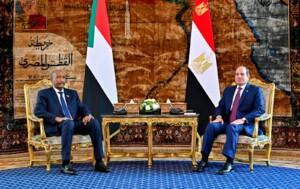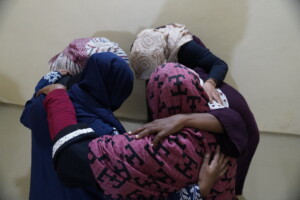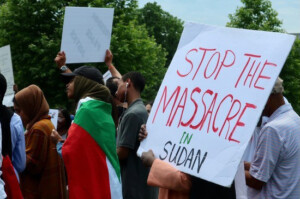Fear of cholera outbreak in West Darfur
At a press conference in Khartoum yesterday, Ismail El Taj, a leading member of the Sudanese Professionals Association (SPA), warned of cholera and measles outbreaks in El Geneina’s shelters of newly displaced people.
 Representatives of West Darfur Arab tribes and Masalit sign an agreement to end hostilities in the presence of RSF deputy commander Abdelrahim Dagalo (Social media)
Representatives of West Darfur Arab tribes and Masalit sign an agreement to end hostilities in the presence of RSF deputy commander Abdelrahim Dagalo (Social media)
At a press conference in Khartoum yesterday, Ismail El Taj, a leading member of the Sudanese Professionals Association (SPA), warned of cholera and measles outbreaks in El Geneina’s shelters of newly displaced people.
El Taj stated that such an outbreak could lead to hundreds of deaths. He said that some 109,000 displaced people, mostly children, women and elderly, are living in terrible conditions in 84 shelter centres in El Geneina , capital of West Darfur. “There is nothing to protect them from the cold.” More in general, El Taj complained about insufficient health facilities for the newly displaced in El Geneina.
A month ago, large groups of gunmen attacked El Geneina and the two Kerending camps for displaced, killing at least 163 people and wounding even more. The Darfur Bar Association reported at the time that the violence was triggered by “a simple crime”. A Masalit tribesman stabbed a member of an “Arab tribe”* to death near the Kerending camps.
Though the killer was arrested, relatives of the victim sought revenge and attacked El Geneina from all directions. They were supported by groups that came from Saraf Omra in North Darfur, Central Darfur, and the border area with Chad.
Over 123,000 people were displaced as a result of the massacre. Many of them now reside in schools, government buildings and makeshift shelters in El Geneina.
A week later, Arab tribesmen set up a sit-in in El Geneina, blocking main roads and the bridge over the river.
SPA spokesman El Taj noted that humanitarian aid could not reach El Geneina as a result of the sit-in. He said that this not only affected the people in El Geneina but also the displaced in Zalingei. He called on the government to invite humanitarian organisations to provide relief in West Darfur. He also criticized the government for its failure to protect civilians during the violent events in El Geneina.
Rapid Support Forces
El Taj acknowledged that the Rapid Support Forces (RSF) have been “able to bring about a state of calm”. However, he also added that the deployment of the RSF would not bring about a sustainable peace.
He said that the RSF depend on “force and control” and that the past actions of the RSF, whose members have been accused of atrocities, “remain stuck in the minds of the people”. He demanded the deployment of “national, professional and supportive forces to help support the revolution”.
Judicial deficiencies
According to El Taj “judicial deficiencies reinforce the culture of impunity” in Sudan. He pointed out that those accused of the attack on Kerending 1 camp have not yet faced trial. He called on the judicial authorities to protect witnesses, pointing to the killing or disappearance of 21 witnesses during the attack on Kerending 1 camp.
The SPA stated the judicial authorities should develop laws that criminalise violent hate speech, speed up the Transitional Justice Commission, support the reconciliation initiative of the University of El Geneina, and monitor borders with neighbouring countries.
Engineer Mohamed Mutasim, who is also a member of the SPA, attributed the recent violent events in El Geneina to “a lack of regular security presence, the absence of judicial authorities and the absence of the state”. He called what is happening in West Darfur “the implementation of evil goals”. He stated that the SPA has acquitted the Masalit tribe of any attacks on residential areas or properties. He also said that an attack on an area where a particular tribe resides is a war crime and a crime against humanity.
Agreement
On Saturday, the Masalit tribe and the Arab tribes in West Darfur signed an agreement to end hostilities at the office of the Government Secretariat in El Geneina. Lt Gen Abdelrahim Dagalo, deputy commander of the RSF, is guarantor of the agreement and acts as a representative of the Sudanese government.
Abdelrahim Dagalo said during the signing ceremony that the agreement “confirms keenness and commitment to turn the page of the past”. He indicated that the agreement contains “the shared views of all parties involved”.
Prince Hafez Tajeldin, representative of the Arab tribes, stressed not to confuse social and political issues. Criminals and promoters of sedition must be dealt with in accordance with the law, he added.
* The major tribes in Darfur are the Fur, Masalit, and Zaghawa. The predominantly nomadic tribes, called Arabs in Sudan, live in the larger part of northern Darfur and the predominantly non-Arab or African sedentary group, mainly composed of peasant farmers, live in the western and southern regions of Darfur.











 and then
and then